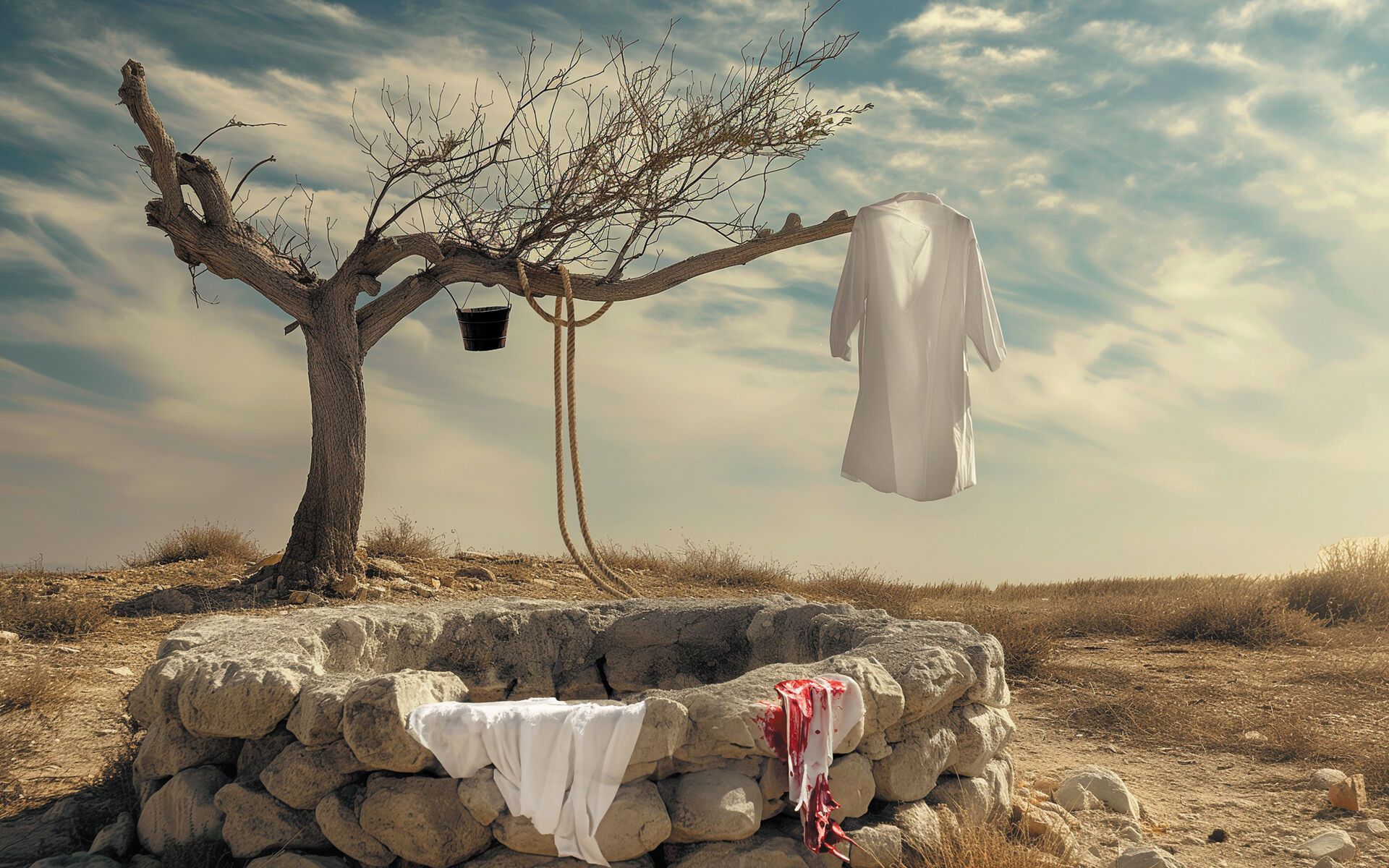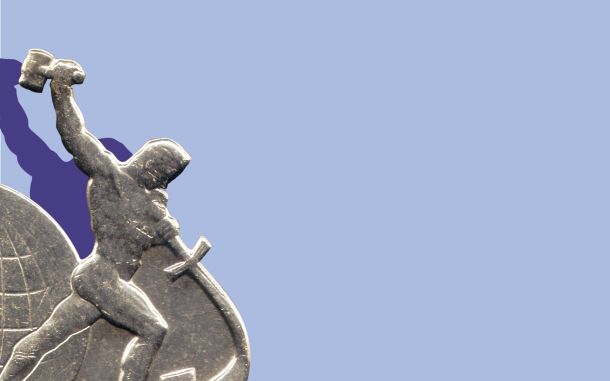The Three Shirts of Joseph

In This Article
-
The story of Joseph, upon him be peace, revolves around three types of shirts which play different roles in the Qur’an. However, in the Bible, Joseph is presented with one tunic which is brought to his father Jacob with false blood on it as a proof of Joseph’s death.
-
Joseph is deprived of his human dignity by his own blood brothers. With this deprivation he stands on behalf of all those human beings, whose dignity has been constantly violated.
-
“When they saw him they were so stricken with admiration of him that they cut their hands exclaiming: ‘God save us! this is no human mortal; he is but a noble Angel.’”
-
Prophet Jacob’s patience and serenity amidst challenges and frauds brought about by his children gained him the sight to see his son Joseph, fully alive and a master of all Egypt.
One of the Jewish prayers says: “Ah, what is man that you should keep him in mind, the son of man that you care for him. Yet you have made him little less than a God you have crowned him with glory and splendour” (Psalm 8:4-5).
Each human life indeed, is meaningful and precious in God’s eyes. Life matters. The tragedy of life today is that human beings have lost sense of the divine. This gives rise to various crimes, wars and killing happening almost every day in different corners of our planet as depicted in media headlines. If only we would rediscover the dignity and value of human life through the lens of our Creator, our world would have been a paradise where the sound of weapons and bombs of all kinds are not heard. But only the sound of peaceful music and cheerful dance!
In one of his books, Anselm Grün says: “God wants to pronounce something into this world that He can only make known by me, as I have been made and have become. Each human person is unique. He or she is an image of that which God desired for him or her. And my calling is to allow that unique particular image of God to shine forth in this world” [1].
The story of Joseph is quite enriching and embarrassing at the same time. It is related in such a way that it captures the attention of everyone who is interested in learning about the meaning of life and the truth contained in the dreams. The main personage in this story is Joseph, the son of Jacob. It is worth noting that the Qur’an recognizes both Joseph and Jacob as Prophets. However, the focus of my reflection is on the role played by the shirt of Joseph as his story is related in the Qur’an. Surprisingly, the story of Joseph upon him be peace, revolves around three types of shirts which play different roles in the Qur’an. However, in the Bible, Joseph is presented with one tunic which is brought to his father Jacob with false blood on it as a proof of Joseph’s death (see Gen. 37:31).
Shirt 1: The shirt returned with false blood
In an actual sense, the shirt of a person symbolises his dignity. It is an outer garment; it covers the nudity of a person, it protects the person against cold, and other dangers. It is essential for the body as well as being intimate to the body.
This means that Joseph is deprived of his human dignity by his own blood brothers. With this deprivation he stands on behalf of all those human beings, whose dignity has been constantly violated – victims of human trafficking, domestic abuse, harassment of all forms, victims whose dignity is often taken away by their fellow kinsmen, and their fellow women for their selfish interests, pleasure and satisfaction.
Taking off a person's dignity is equal to taking a person's life. Joseph’s brothers tried to strip him of his shirt, to reduce him to the state of nature, “état de nature.”
The action of Joseph’s brothers expresses their intention. In fact, they had planned to kill him as we read in verse 15 of Surah Yusuf: “and so they went away with him and decided to put Joseph in the depth of the well.” Likewise, in the Bible, it is stated that his brothers upon seeing Joseph said to themselves: “Here comes this dreamer, come now let us kill him and throw him into one of the pits, then we shall say that a wild beast has devoured him and we shall see what will become of his dreams” (Genesis 37:19-20).
A similar verse is found in the Qur’an stating that Joseph’s brothers said: “Our father! We went off racing with one another, and left Joseph behind by our things, then a wolf devoured him. But we know that you will not believe us even though we speak the truth” (Qur’an 12:17).
This murderous intention of Joseph’s brothers explains the aspect of the false blood on the shirt of Joseph which they take to their father Jacob. To support their lie, they dumped the shirt in goat blood.
The false blood on Joseph’s shirt
Etymologically, the word “blood” is from proto- Germanic word, “blodam.” Blood is a fluid which circulates in the arteries and veins. It goes without saying that blood is the symbol of life. Several countries across the globe where valiant citizens and heroes fought for the independence up to the shedding of blood, have adopted the colour red in their flags as a vivid symbol of honouring those who gave up their lives for the freedom of their countries. Hence Joseph’s brothers bring a message of his death to their father Jacob. In doing so, they implicitly killed themselves as well in the heart of their father who was an old man, for a popular adage says, “blood is thicker than water.”
Similarly, the Bible portrays this episode of false blood, stressing the fact that Joseph’s brothers lied to their father about the death of his beloved Joseph: “Then they took Joseph’s robe, slaughtered a goat, and dipped the robe in the blood” (Genesis 37:31).
Furthermore, Joseph’s brothers wanted to kill the love of Joseph in their father's heart through bringing him the shirt with false blood. But instead, they killed themselves in their father's heart. They wanted to kill the name for Joseph and cut it off from their family and father’s mind, instead, they made it more known far beyond their family and country not less far than Egypt.
The fact is that Joseph’s brothers through their evil conspiracy made him known to the Ishmaelites, to the Midianite and later to the Egyptians, as reported in Genesis 37:27-28. A similar verse in Surah Yusuf captures the same message that: “God had full knowledge of what they were doing” (Qur’an 12:19). Hence, God is always in control of time in history. He's the Omniscience, the All-Seer, the Omni-Present.
Nevertheless, the love Jacob had for Joseph did not die. Regardless of the envy, jealousy, malice and hatred of Joseph’s brothers to kill him, he remained alive in the heart of his father Jacob, he still had the same place and love he had before in the heart of Prophet Jacob, upon him be peace. Hence, love is stronger than death; nothing can kill love not even death of the beloved.
Shirt 2: The shirt torn from the back
In the Qur’an it is quoted that Joseph was so handsome that the woman of his master desired to lure him. Moreover, other ladies upon seeing Joseph would cut their fingers as the Qur’an portrays: “She gave to each of them (ladies) a knife and said to Joseph: ‘come out before them!’ When they saw him they were so stricken with admiration of him that they cut their hands exclaiming: ‘God save us! this is no human mortal; he is but a noble Angel’” (Qur’an 12:31). Prior to this episode, we have the story of the woman of his master who in trying to force Joseph to have relations with her ended up tearing his shirt as we read: “So they raced to the door, and she tore his shirt from the of back, and they met her master (husband) by the door” (Qur’an 12:25).
This metaphor of Joseph’s shirt torn from the back is very fascinating. I suggest two possible kinds of interpretations from what happened: lust of the woman and the honesty and faithfulness of Joseph.
The danger of lust
Lust is a very disordered desire. If it is not well channelled, lust can lead one to cause scandals. In fact, in Catholic tradition, lust is listed among the capital sins along with (envy or jealousy, anger, sloth, gluttony, pride and greed) [2]. The incident of the woman of Joseph’s master captures well the danger of lust. Just like the brothers of Joseph, the wife of his master wants to take the dignity of Joseph by stripping him of his shirt. Lust for someone cute and attractive is the expression of human reality, human nature. Actually, lust for the opposite sex is one of the three powers that God has equipped humankind with. As human beings, we have lust for the opposite sex, lust for earning, lust for the comforts of life, and lust for offspring.
Three major powers human beings have
Every human being is endowed with three powers inherent to our human nature: “the power of lust; the power of anger to protect yourself and one's values; and the power of the intellect” [3].
These three powers are by nature fallible, forgetful, neglectful, fond of disputing, obstinate, selfish, and envious. They need to be disciplined and channelled into virtues in order to attain happiness as social beings, both in the individual and collective life, in the world and in the hereafter, and to rise to higher ranks of humanity. For instance, obstinacy can be channelled into steadfastness, in right and truth, and envy into the feeling of competition to do good things.
It is noteworthy that the key to happiness and the perfection of individuals lies in their effort to overcome the negative aspects of their nature. This involves either limiting these negative traits or transforming them into virtues, along with cultivating positive qualities. By doing so, individuals can evolve into virtuous, worshipping servants of God, and useful members of society.
Honesty and faithfulness
There are good qualities for one to cultivate in life. An honest and faithful person is never afraid of anything, not even their opponents. Joseph is saved by his shirt having been torn from the back, against the accusation from the wife of his master. Joseph is honest in saying the truth. Honesty sets a person free. It makes one trustworthy. Honesty saves and consoles the owner. Hence, the shirt torn from the back saves the life of Joseph. It saves him from the malice and evil plan of the woman, wife of his master as she exclaimed: “What should be the recompense of him who purposes evil against your household, except imprisonment or a grievous punishment” (Qur’an 12:25).
However, God was in control of everything, and Joseph was a God-fearing man. Following the false accusation by the wife, one of those who was witnessing the event observed the torn shirt at the back of Joseph and said: “But if it is torn from the back, then she is lying, and he is truthful” (Qur’an 12:27). Unlike the first incident where a shirt declared Joseph dead, this torn shirt at the back becomes the evidence that saves Joseph’s life.
Shirt 3: The healing power of Joseph’s shirt [4]
After the brothers of Joseph had come to Egypt to look for food and met with Joseph who had made himself known to them and forgave them, he commissioned with his own shirt the healing power of restoring sight to his old father, Prophet Jacob, upon him be peace. “Go with this shirt of mine and lay it over my father’s face, and he shall recover his sight; and come to me with all your people” (Qur’an 12: 93).
There are three things to single out from this episode: first and foremost, Joseph gives and sends his shirt to his father out of his own free will. Secondly, this shirt of Joseph carries the healing power of recovering his father Jacob’s sight, and lastly, the shirt of Joseph brings about the redemption of the entire household of Jacob.
When his father Jacob smells the shirt, he will soon discover that his beloved Joseph is alive. Through this shirt, Joseph sends back his dignity to his beloved father. In contrast to the first shirt given to his father by his brothers, which conveyed a message of Joseph's death, this third shirt is offered willingly by Joseph with the intent of rectifying the damage caused by the initial garment. Unlike the bloody first shirt, this one carries with it the healing power of restoring Jacob’s sight.
The healing power of the third shirt: Jacob’s recovery of sight
Prophet Jacob, upon him be peace, who had been waiting patiently and trustingly to see his beloved son Joseph one day, as soon as he received the shirt, “laid it over his face and he regained his sight.” (Qur’an 12:96)
Here, once more, the omniscience, omnipresence and omnipotence of God is revealed and confessed by Jacob: “Did I not tell you that I know from God what you do not know? (Qur’an 12:96). Indeed, the prophet Jacob, upon him be peace, had been actively patient, waiting for this day. His patience and serenity amidst challenges and frauds brought about by his children gained him the sight to see his son Joseph, fully alive and a master of all Egypt.
The redemption of the household of Jacob
From that moment onward, Jacob and his entire household departed from their land to Egypt, where Joseph graciously provided them with a comfortable dwelling. It is recounted in Genesis 47:11 that “Joseph settled his father and his brothers and granted them a holding in the land of Egypt, in the best part of the land, in the land of Rameses, as Pharaoh had instructed.”
Conclusion
Life is sometimes full of challenges of many kinds. Some of these challenges may come from those closest to us. We usually find ourselves being let down by the events that occur in our life depending on how we have placed our confidence in them. Like the brothers of Joseph, envy and jealousy can push people to destroy you in life. Reflecting on the story of Joseph's reported death, Jacob took the time to meditate and consider, sensing that something was amiss. He remained calm, trusting that one day the truth about Joseph would be revealed.
What is important is to fight our ego and try to go beyond our limitations to overcome the complexities of human relationships.
Therefore, it is up to each individual to find out the hidden meaning of his or her own life and be useful to your family, your society and to the whole of humanity like Joseph did. The way to reach this new reality, as Joseph did to his brothers, is forgiveness that heals, that is tolerant and builds up new relationships. In fact, Fethullah Gülen remarks, “the greatest gift that the generation of today can give their children and grandchildren is to teach them how to forgive. Forgive even when confronted by the worst behaviour and the most disturbing events” [5].
Notes
- Marcel G. Neels, Come closer to yourself, (UK: AuthorHouse, 2013), 10.
- These are referred to as capital sins because when they aren’t overcome in ones’ life, they easily lead to other sins.
- Ali Ünal, The Qur’an with Annotated interpretation in Modern English, (USA: New Jersey, 2006), 477.
- This designation is a personal title given to the shirt that Joseph sends to his Father through his brothers. In fact, this marks the shirt 3 of Joseph just after the two previous ones. The designation “Healing power of Joseph’s shirt” is inspired by the Qur’an 12:93 “Go with this shirt of mine and lay it over my father’s face, and he shall recover his sight; and come to me with all your people.”
- Fethullan Gülen, Toward a Global Civilization of love and Tolerance, (USA: New Jersey, 2006,) 29.








